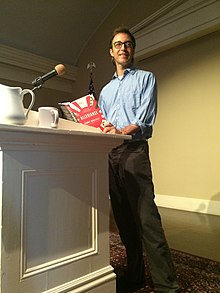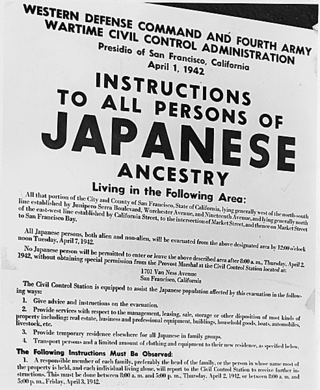
Executive Order 9066 was a United States presidential executive order signed and issued during World War II by United States president Franklin D. Roosevelt on February 19, 1942. "This order authorized the forced removal of all persons deemed a threat to national security from the West Coast to "relocation centers" further inland—resulting in the incarceration of Japanese Americans." Two-thirds of the 125,000 people displaced were U.S. citizens.
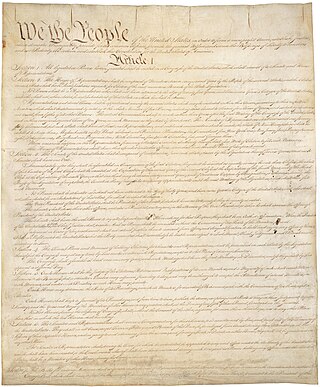
The Constitution of the United States is the supreme law of the United States. It superseded the Articles of Confederation, the nation's first constitution, on March 4, 1789. Originally including seven articles, the Constitution delineates the frame of the federal government. The Constitution's first three articles embody the doctrine of the separation of powers, in which the federal government is divided into three branches: the legislative, consisting of the bicameral Congress ; the executive, consisting of the president and subordinate officers ; and the judicial, consisting of the Supreme Court and other federal courts. Article IV, Article V, and Article VI embody concepts of federalism, describing the rights and responsibilities of state governments, the states in relationship to the federal government, and the shared process of constitutional amendment. Article VII establishes the procedure subsequently used by the 13 states to ratify it. The Constitution of the United States is the oldest and longest-standing written and codified national constitution in force in the world.

During World War II, the United States forcibly relocated and incarcerated about 120,000 people of Japanese descent in ten concentration camps operated by the War Relocation Authority (WRA), mostly in the western interior of the country. Approximately two-thirds of the detainees were United States citizens. These actions were initiated by Executive Order 9066, issued by President Franklin D. Roosevelt on February 19, 1942, following Imperial Japan's attack on Pearl Harbor, Guam, the Philippines, and Wake Island in December 1941. Before the war, about 127,000 Japanese Americans lived in the continental United States, of which about 112,000 lived on the West Coast. About 80,000 were Nisei and Sansei. The rest were Issei immigrants born in Japan, who were ineligible for citizenship. In Hawaii, where more than 150,000 Japanese Americans comprised more than one-third of the territory's population, only 1,200 to 1,800 were incarcerated.

Robert Houghwout Jackson was an American lawyer, jurist, and politician who served as an associate justice of the U.S. Supreme Court from 1941 until his death in 1954. He had previously served as United States Solicitor General and United States Attorney General, and is the only person to have held all three of those offices. Jackson was also notable for his work as Chief United States Prosecutor at the Nuremberg trials of Nazi war criminals following World War II.
Korematsu v. United States, 323 U.S. 214 (1944), was a landmark decision by the Supreme Court of the United States that upheld the internment of Japanese Americans from the West Coast Military Area during World War II. The decision has been widely criticized, with some scholars describing it as "an odious and discredited artifact of popular bigotry", and as "a stain on American jurisprudence". The case is often cited as one of the worst Supreme Court decisions of all time. Chief Justice John Roberts repudiated the Korematsu decision in his majority opinion in the 2018 case of Trump v. Hawaii.
Peter H. Irons is an American political activist, civil rights attorney, legal scholar, and professor emeritus of political science. He has written many books on the U.S. Supreme Court and constitutional litigation.

Owen Josephus Roberts was an associate justice of the United States Supreme Court from 1930 to 1945. He also led two Roberts Commissions, the first of which investigated the attack on Pearl Harbor, and the second of which focused on works of cultural value during World War II.
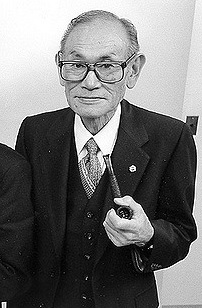
Fred Toyosaburo Korematsu was an American civil rights activist who resisted the internment of Japanese Americans during World War II. Shortly after the Imperial Japanese Navy launched its attack on Pearl Harbor, President Franklin D. Roosevelt issued Executive Order 9066, which authorized the removal of individuals of Japanese ancestry living on the West Coast from their homes and their mandatory imprisonment in incarceration camps, but Korematsu instead challenged the orders and became a fugitive.
The powers of the president of the United States include those explicitly granted by Article II of the United States Constitution as well as those granted by Acts of Congress, implied powers, and also a great deal of soft power that is attached to the presidency.
Hirabayashi v. United States, 320 U.S. 81 (1943), was a case in which the United States Supreme Court held that the application of curfews against members of a minority group were constitutional when the nation was at war with the country from which that group's ancestors originated. The case arose out of the issuance of Executive Order 9066 following the attack on Pearl Harbor and the U.S. entry into World War II. President Franklin D. Roosevelt had authorized military commanders to secure areas from which "any or all persons may be excluded", and Japanese Americans living in the West Coast were subject to a curfew and other restrictions before being removed to internment camps. The plaintiff, Gordon Hirabayashi, was convicted of violating the curfew and had appealed to the Supreme Court. Yasui v. United States was a companion case decided the same day. Both convictions were overturned in coram nobis proceedings in the 1980s.
Allegiance is the duty which a subject or citizen is widely expected to owe to the state to which he or she belongs.
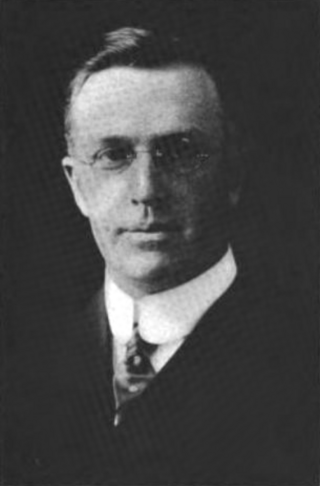
William Denman was a United States circuit judge of the United States Court of Appeals for the Ninth Circuit.
The Supremacy Clause of the Constitution of the United States establishes that the Constitution, federal laws made pursuant to it, and treaties made under its authority, constitute the "supreme Law of the Land", and thus take priority over any conflicting state laws. It provides that state courts are bound by, and state constitutions subordinate to, the supreme law. However, federal statutes and treaties must be within the parameters of the Constitution; that is, they must be pursuant to the federal government's enumerated powers, and not violate other constitutional limits on federal power, such as the Bill of Rights—of particular interest is the Tenth Amendment to the United States Constitution, which states that the federal government has only those powers that are delegated to it by the Constitution. It is the responsibility of the United States Supreme Court in that case to exercise the power of judicial review: the ability to invalidate a statute for violating a provision of the Constitution.
The Fred T. Korematsu Institute for Civil Rights and Education is a non-profit organization which advances pan-ethnic civil rights and human rights through education.
Eric Yamamoto, the Korematsu Professor of Law and Social Justice at the William S. Richardson School of Law at the University of Hawaiʻi at Mānoa, is an internationally recognized expert on issues of racial justice, including racial reconciliation and redress. Flowing from the landmark 1944 Korematsu v. United States case, he is known for his work as a member of Fred Korematsu's 1983 legal team that succeeded in having Korematsu's original conviction overturned.
The Fred Korematsu Day of Civil Liberties and the Constitution is celebrated on January 30 in California and a growing number of additional states to commemorate the birthday of Fred Korematsu, a Japanese-American civil rights activist best known for resisting the internment of Japanese Americans. It also recognizes American civil liberties and rights under the Constitution of the United States. It is the first day in U.S. history named after an Asian American.

The Stone Court refers to the Supreme Court of the United States from 1941 to 1946, when Harlan F. Stone served as Chief Justice of the United States. Stone succeeded the retiring Charles Evans Hughes in 1941, and served as Chief Justice until his death, at which point Fred Vinson was nominated and confirmed as Stone's replacement. He was the fourth chief justice to have previously served as an associate justice and the second to have done so without a break in tenure. Presiding over the country during World War II, the Stone Court delivered several important war-time rulings, such as in Ex parte Quirin, where it upheld the President's power to try Nazi saboteurs captured on American soil by military tribunals. It also supported the federal government's policy of relocating Japanese Americans into internment camps.
Trump v. Hawaii, No. 17-965, 585 U.S. ___ (2018), was a landmark United States Supreme Court case involving Presidential Proclamation 9645 signed by President Donald Trump, which restricted travel into the United States by people from several nations, or by refugees without valid travel documents. Hawaii and several other states and groups challenged the Proclamation and two predecessor executive orders also issued by Trump on statutory and constitutional grounds. Citing a variety of statements by Trump and administration officials, they argued that the proclamation and its predecessor orders were motivated by anti-Muslim animus.
An anticanon is a legal text that is now viewed as wrongly reasoned or decided. The term "anticanon" stands in distinction to the canon, which contains basic principles or rulings that almost all people support.
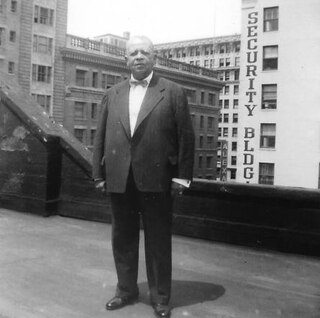
Hugh Ellwood Macbeth Sr. (1884-1956) was an African American attorney who defended Japanese American wartime legal rights in California during the Second World War.
